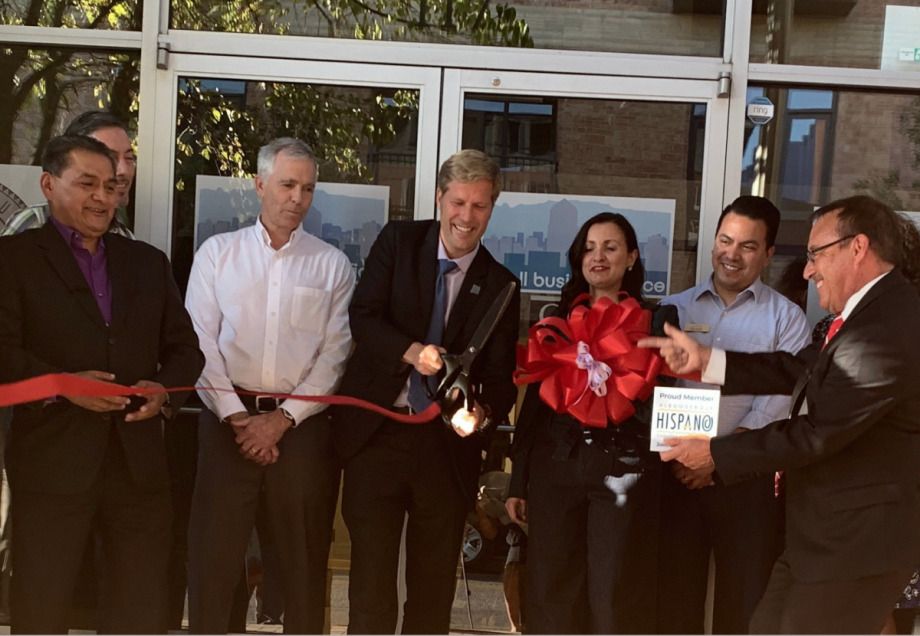Validation. That’s what Synthia Jaramillo remembers feeling most on the morning of September 25, 2019, when the city of Albuquerque cut the ribbon at its new Small Business Office.
“The fact that we’re just now for the first time launching an office to support small businesses, it’s a tragedy,” Jaramillo tells Next City. “This was long overdue.”
For the last two decades plus, Jaramillo ate, slept and breathed that neglect. She first experienced it professionally as a small business banker serving mostly minority-owned businesses at a mainstream bank branch on 4th Street NW in Albuquerque. From there she worked at the Albuquerque Hispano Chamber of Commerce for 15 years. (She took a two-year “sabbatical” to run a childcare center in an underserved part of the Albuquerque metro area.)
Today, in a city that is half Hispanic, Jaramillo is the first Latina, the first woman of any race to serve as Albuquerque’s director of economic development. Opening up the Small Business Office was one of many steps she is planning to take for her department and her city to redesign policies and practices to support the majority of people in Albuquerque who are Hispanic, black and indigenous, as well as other people of color.
“There are so many folks leading this type of racial equity work who are not reflective of the community they are trying to serve,” Jaramillo says. “One thing I believe is important for all of us — black, brown, other people of color — is to insist on having a seat at the table. It’s critically important to actually see some of this work being led by people of color.”
Jaramillo has her work cut out for her. Appointed by Mayor Tim Keller after his inauguration in December 2017, she faces a city of yawning small business disparities by race as well as gender. According to the most recent available data from the U.S. Census Bureau, the average white-owned business in Albuquerque earns $461,657 in revenue a year, compared with just $181,233 for Hispanic-owned businesses, $157,372 for indigenous-owned businesses, and $82,161 for black-owned businesses. The average male-owned business in Albuquerque earns $619,346 in revenue a year, compared with $164,603 for female-owned businesses.
Voters have helped to create the space for Jaramillo to finally do something about those disparities. In 2005, they passed a ballot measure to create a public campaign financing system for municipal elections. But only one mayoral candidate in 2017 accepted public financing (though private dollars also flowed in support of his election), and voters eventually chose that candidate: Keller.
“It was very fortunate to have been recruited to Mayor Keller’s team,” Jaramillo says. “His entire platform for economic development led with supporting homegrown small businesses.”
A former New Mexico state auditor, Keller initially focused on shifting city government procurement dollars going out of state to local suppliers. Keller and Jaramillo also conducted a six-month listening tour to understand the barriers facing small businesses around Albuquerque.
“What we heard from small business advocates over and over was the need for an office to support them, whether it’s a business that’s just starting or a business that maybe needs a certificate from the environmental health department or the fire marshal or they’re responding to an RFP [request for proposals] from our purchasing department and the RFP is incredibly difficult to interpret,” Jaramillo says.
As part of the Integration Initiative of Living Cities, a national collaborative of foundations and financial institutions that supports racial equity in local government, Jaramillo had already spent a few years in her capacity at the Hispano Chamber of Commerce visiting and learning from counterparts in New Orleans, Detroit and most especially Texas.
“Every city across the state of Texas, the most conservative state in the union, has these robust set-asides, legislation that has existed for 30-plus years to support minority-owned or local businesses with special offices to support them,” Jaramillo says.
She also found inspiration from something that was working in Albuquerque: the city’s film office, which she also oversees as director of economic development.
“They help production companies with film permits, walking them through various processes, following up with the planning department, very similar functions but they’re working on behalf of location managers and production companies,” Jaramillo says. “This will be a similar model but now this office will help small businesses navigate city bureaucracy.”
Jaramillo says they applied that familiar small business refrain about “location, location” when it came time to choosing an office site too.
“We were intentional to make sure the office was outside city hall,” Jaramillo says. “City hall can be intimidating for anybody. It’s not the most welcoming. And we were intentional about making sure to be co-located with other small business support services.”
They found an ideal spot for the Small Business Office, centrally located downtown, in a space shared with the Color Theory Initiative, which is part of the larger Community Navigators. That program is already providing free assistance to connect small businesses with available resources in the city, for capital or other small business needs. The space is in a building owned by the McCune Charitable Foundation.
“The idea for this office is to support wraparound services when it comes to a business that is trying to do business with the city of Albuquerque, or that is just establishing a business within city limits,” Jaramillo says. “The levels of red tape and bureaucracy that these businesses have to face, especially if they’re minority-owned maybe there’s a language barrier.”Jaramillo also wants the Small Business Office to work from the other side of the table as well — proactively identifying contracts with out-of-state vendors across various city departments and identifying possible local businesses to bid on those contracts when they come up for renewal. Since January 2019, the city has switched six contracts, representing more than $7.1 million, from out-of-state vendors to Albuquerque companies. The city also reports that it currently spends over $400 million on goods and services annually, 65 percent with local vendors.
As meaningful as it is, establishing Albuquerque’s new Small Business Office was relatively low-hanging fruit. It didn’t require any legislative or budgetary changes to create room for the three staff positions in the new office.
There’s plenty of higher-to-reach fruit that Jaramillo can aim for when it comes to shifting economic development policies and practices in Albuquerque away from providing support to projects and businesses that may not need it or don’t promise many benefits for the majority of the city who are people of color.
“We still are doing sprawl development here in Albuquerque, and we’re still trying to recruit large industries. It’s kind of like the Hunger Games model of getting all these urban areas fighting against each other over who can give away the most tax breaks to wealthy entities,” says George Luján, executive director at the Southwest Organizing Project. “So that has continued and that’s always going to be a barrier until we change our approach.”
Luján cites a new Facebook data center, which opened earlier this year, as a prime example of that approach to economic development. In support of the data center, local officials from the town outside of Albuquerque approved $30 billion in industrial revenue bonds — essentially a 30-year property tax abatement.
“All the above-the-line jobs are going to people from out of state who were brought in by the company, and the local positions are really for janitors and other low-wage jobs,” Luján says.
Since 1985, New Mexico has seen over 100 industrial revenue bond transactions totaling many billions of dollars, issued by over 40 municipalities and counties, subsidizing projects for companies such as Facebook, Intel, Walmart and General Mills.
“You have to dismantle that, it’s not like you can vote someone in and it just switches,” Luján says. “We’ve got to make sure that it is a commitment to a different approach of economic development and not just lip service.”
In his previous job as state auditor, Keller was a noted crusader for transparency and accountability with regard to economic development subsidies. Jaramillo, meanwhile, has expressed interest in exploring whether the city of Albuquerque’s power to issue industrial revenue bonds can be used to support small, local businesses.
“We’re having those conversations now at the city level thinking about policy changes that will happen next,” Jaramillo says.
This article is part of The Bottom Line, a series exploring scalable solutions for problems related to affordability, inclusive economic growth and access to capital. Click here to subscribe to our Bottom Line newsletter.

Oscar is Next City's senior economic justice correspondent. He previously served as Next City’s editor from 2018-2019, and was a Next City Equitable Cities Fellow from 2015-2016. Since 2011, Oscar has covered community development finance, community banking, impact investing, economic development, housing and more for media outlets such as Shelterforce, B Magazine, Impact Alpha and Fast Company.
Follow Oscar .(JavaScript must be enabled to view this email address)



















